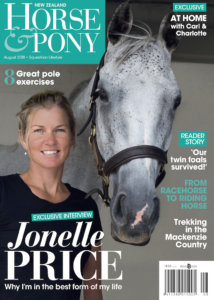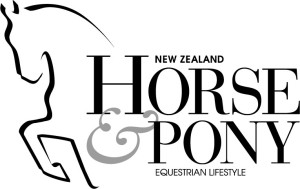
Bouncing to stardom
WEG number two was held in the heart of Holland, at The Hague. Paris was initially selected as the event location, but the French project fell apart and a few months later the second-placed bidders from The Netherlands took on the task. Despite their enormous enthusiasm and the country’s excellent reputation for show management, a series of major issues arose including problems with site management and ticketing, and the 1994 edition ended in financial bankruptcy.
It took place at an interesting time in terms of world history; the USSR had ceased to exist and so riders from ‘new’ countries such as Russia, Belarus and the Ukraine took part, as well as those from Croatia, the Czech Republic and Slovakia. But it was the newly reunited Germany that dominated, in both dressage and show jumping.
Our own Vaughn Jefferis and Bounce triumphed in eventing, and Paulette Stannard put us on the endurance map.
Our representatives:

The eventing team was Andrew Nicholson (Jagermeister II), Blyth Tait (Delta), Vaughn Jefferis (Bounce) and Mark Todd (Just an Ace), with Vicky Latta (Chief) and Sally Clark (Squirrel Hill) as individuals. Maurice Beatson and My Irish Embassy were the sole show jumping representatives, and endurance had Paulette Stannard (Zephyr) and Howard Harris (Eastwinds Chloe). We also had a vaulter, David McIntyre. Our selected dressage rep, Fiona Craig was unable to compete as her horse, Marcus, was injured.
How we fared:
After three years of single-minded preparation, Vaughn Jefferis achieved his goal of World Championship gold. He and Bounce finished 18th in dressage, but shot up to third after cross-country. The course was big and tough, and ridden in high temperatures made even worse by soaring humidity. Bounce almost crashed in the first water complex but got through somehow and finished with 0.8 time. “He was absolutely brilliant,” said Vaughn. “So honest to go on in the first water. The course was fine but very tiring.”

They then show jumped clear, taking the win from Dorothy Trapp (USA) and Brit Karen Dixon. Backstage, Zara Phillips helped groom for our eventing riders.
The team finished sixth: Blyth had a fall and retired, Mark had a fall but finished on 168 penalties for 47th place, and Andrew fell too, finishing just behind him on 168.20. Vicky Latta was second best of the Kiwis, finishing 26th on 106.2pen.
Paulette and Zephyr finished the endurance in bronze medal position, after twice being sent in the wrong direction and covering extra ground as a result. Applause was huge as the pair entered the stadium, with Zephyr seeming in good shape. But, heartbreakingly, he failed the final check (the Dutch vet passed him, but the other two did not). It was his first vet-out in 3500km of competition, and the decision was controversial though Paulette accepted it with absolute grace. “It was so neat coming into that arena – what a buzz! That will stay with me for the rest of my life.”

Howard and Chloe, struggling in the extreme heat and humidity, withdrew at the first gate.
Maurice Beatson was unfortunate in the jumping, with two falls; and 17-year-old David McIntyre, who took up vaulting in January that year, competed with a sprained ankle and threw his heart into the job, but was up against impossible odds.

The best of the rest:
Germany won team and individual gold medals in dressage, driving and show jumping.
Unusually, the final four show jumpers were all mares, and all were German-bred. Three were ridden by Germans; one by a Frenchman. The title went to Franke Sloothak of Germany on his blue-eyed chestnut, Weihawiwej; Franke was the only rider to get all four mares around the final horse-swap without a fault.

His fellow countryman Ludger Beerbaum and Ratina Z took individual silver, and the bronze went to France’s Michel Robert on Miss San Patrignano. Ratina Z was ‘Best Horse’, with four clear rounds in the final.
In dressage, a new format was introduced, which saw the Grand Prix decide the team medals, and two separate individual championships: the GP Special and the kür, or freestyle to music.
The team competition was a gripping affair, with Germany encountering the biggest threat to their supremacy since they were beaten by the Soviet Union at the Olympic Games in Munich, 22 years earlier. The Dutch team, which had just three members, were close behind in silver, while the USA lifted team bronze.

Isabell Werth and Gigolo won the Special, with fellow German Nicole Upholff-Becker and Rembrandt in silver, while Dutchman Sven Rothenberger and Dondolo took out bronze.
But Dutch super-star Anky van Grunsven and Bonfire turned the tables in the freestyle, winning gold, with Germans Klaus Balkenhol (Goldstern) and Karen Rehbein (Donnerhall) behind her in silver and bronze.

In the eventing teams competition, the all-female side from Great Britain had a runaway victory, leading throughout. France took silver, and Germany the bronze.
In endurance, the individual medal gold was won by Valerie Kanavy and Pieraz (USA) but the competition was dominated by French riders, who took second to sixth places and were untouchable for team gold. Spain won the silver, and Australia the bronze.
Facts & figures
A total of 37 countries participated in the 1994 FEI World Equestrian Games.
- Jumping 83 Participants (27 countries)
- Dressage 61 Participants (23 countries)
- Eventing 93 Participants (22 countries)
- Driving 44 Participants (15 Countries)
- Endurance 99 Participants (23 countries)
- Vaulting 76 Participants (18 countries)
 Enjoyed this article? NZ Horse & Pony is available where all great magazines are sold, or to subscribe, visit this link
Enjoyed this article? NZ Horse & Pony is available where all great magazines are sold, or to subscribe, visit this link
More stories in this issue:
- Preparing for jump-offs
- Dealing with brain injury
- Reinventing the Kaimanawas
- At home with Chloe Phillips-Harris
- Healthy eating strategies for riders
- Jumping masterclass: finding a distance






